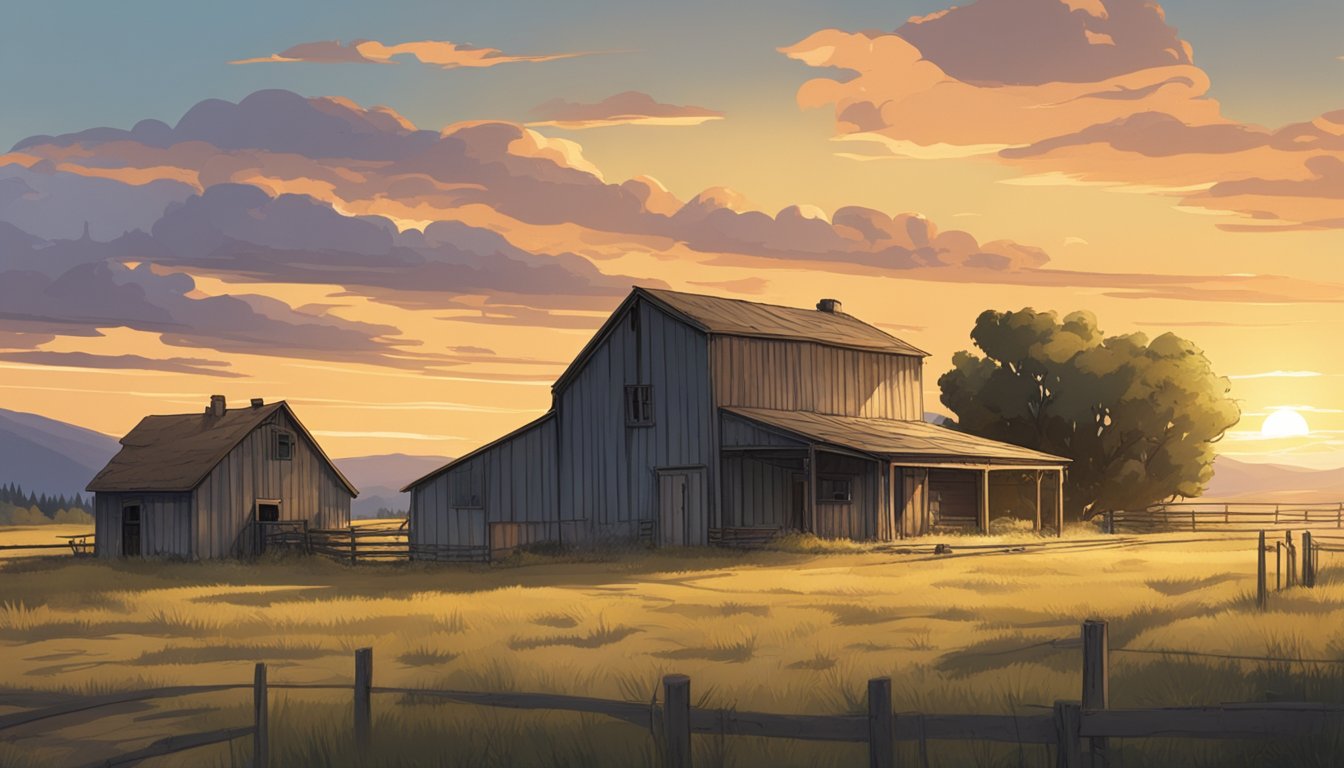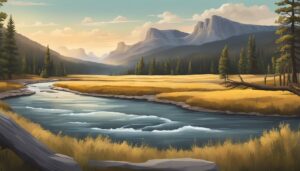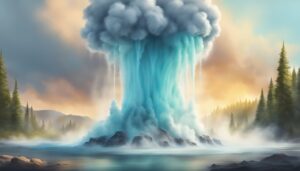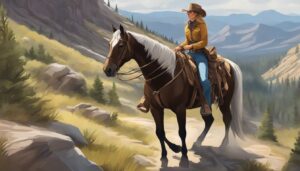Yellowstone, the popular neo-Western drama created by Taylor Sheridan, is coming to an end after its fifth season. The Paramount Network series, which premiered in 2018, has captivated audiences with its gripping portrayal of the Dutton family’s struggles to maintain control of their vast Montana ranch.
The decision to conclude Yellowstone stems from a combination of factors, including Kevin Costner’s reported scheduling conflicts and the network’s desire to expand the franchise. While the show’s ending may disappoint fans, it allows for new storytelling opportunities within the Yellowstone universe.
Season 5 of Yellowstone will serve as the final chapter for the Dutton family saga. The remaining episodes, originally slated for a summer 2023 release, have been delayed. This extended timeline gives viewers a chance to savor the last moments of the series that has become a cultural phenomenon.
Background of ‘Yellowstone’

‘Yellowstone’ burst onto the television landscape as a gripping Western drama, captivating audiences with its portrayal of the Dutton family and their sprawling ranch. The series quickly became a cultural phenomenon, blending modern themes with classic Western elements.
Creation and Production
Taylor Sheridan, known for his work on films like ‘Sicario’ and ‘Hell or High Water’, created ‘Yellowstone’ alongside John Linson. The show premiered on Paramount Network in 2018, marking the channel’s first scripted series. Sheridan’s vision for a neo-Western drama set in contemporary Montana attracted A-list talent, including Kevin Costner as the lead, John Dutton.
Production values were high from the start, with stunning cinematography showcasing Montana’s breathtaking landscapes. The series was filmed on location, adding authenticity to its portrayal of ranch life and the American West.
Evolution of the Series
As ‘Yellowstone’ progressed, it delved deeper into the complexities of the Dutton family dynamics. John Dutton’s children, particularly Beth Dutton (Kelly Reilly), became fan favorites due to their intense and layered performances.
The show expanded its scope beyond the ranch, exploring conflicts with Native American reservations, land developers, and politicians. This broader focus allowed ‘Yellowstone’ to address contemporary issues while maintaining its Western roots.
Character development remained a strong point, with each season revealing new layers to the Duttons and their allies and enemies.
Critical Reception and Global Impact
‘Yellowstone’ initially received mixed reviews from critics but found a devoted audience. Viewership grew steadily, with the show becoming one of cable television’s highest-rated series.
The series garnered praise for its performances, particularly those of Costner and Reilly. Its portrayal of modern ranching life and complex family dynamics resonated with viewers across the United States.
‘Yellowstone’s success led to a global fanbase and spawned several spin-off series, including prequels ‘1883’ and ‘1923’. These expansions cemented the show’s place as a major franchise in the television landscape.
Exploring the Dutton Family Saga
The Dutton family saga forms the heart of Yellowstone, weaving a complex tapestry of power, loyalty, and conflict. Their struggles to maintain control of their vast ranch while navigating personal and political challenges drive the show’s compelling narrative.
Key Characters and Dynamics
John Dutton III stands as the patriarch, fiercely protecting the family legacy. His children – Beth, Jamie, and Kayce – each play crucial roles in the ranch’s operations and conflicts.
Beth Dutton, John’s daughter, is a shrewd businesswoman known for her sharp wit and ruthless tactics. Her complex relationship with adopted brother Jamie adds layers of tension to family dynamics.
Jamie Dutton, the adopted son, often finds himself torn between family loyalty and personal ambition. His legal expertise proves both an asset and a source of conflict.
Kayce Dutton, the youngest son, balances his duties to the ranch with his responsibilities to his own family and Native American heritage.
John Dutton’s Leadership
John Dutton’s leadership style is marked by unwavering determination and a willingness to do whatever it takes to protect his land. His decisions often blur ethical lines, creating both allies and enemies.
John’s influence extends beyond the ranch, reaching into Montana’s political sphere. This power comes at a cost, straining relationships within the family and with external forces.
His methods of maintaining control are frequently controversial, ranging from leveraging political connections to engaging in outright confrontations with opponents.
Beth and Jamie’s Tumultuous Relationship
Beth and Jamie’s relationship is characterized by deep-seated animosity and occasional moments of reluctant cooperation. Their conflicts stem from childhood trauma and differing approaches to family loyalty.
Beth’s unforgiving attitude towards Jamie creates constant tension, affecting family dynamics and business decisions. Their verbal sparring matches are often brutal and revealing.
Despite their animosity, circumstances sometimes force Beth and Jamie to work together, showcasing their combined intelligence and strategic thinking. These rare instances of cooperation highlight the complexity of their relationship and its impact on the Dutton family saga.
Narrative Themes and Developments

Yellowstone explores complex relationships, power dynamics, and the struggle between tradition and progress. The series weaves together personal conflicts and larger societal issues against the backdrop of Montana’s rugged landscape.
Conflict and Alliances
The Dutton family faces numerous threats to their ranch and way of life. They form uneasy alliances with various groups, including the Broken Rock Reservation and local authorities. Chief Thomas Rainwater emerges as both an adversary and occasional ally, highlighting the nuanced relationships in the region.
Ranch hands play a crucial role, with their loyalty to the Duttons tested by external pressures. The Livestock Commission serves as a political battleground, where the family’s influence is both wielded and challenged.
Ranch Life Versus Modernization
The series contrasts traditional ranching culture with encroaching modernization. Cowboys embody a romanticized ideal of the American West, while developers and outsiders represent change.
This clash is evident in land disputes, water rights battles, and debates over resource management. The Duttons struggle to maintain their vast property against economic and political forces pushing for development.
Betrayal, Power, and Survival
Yellowstone delves deep into themes of betrayal within the family and among allies. Power shifts constantly, with characters like Sarah Atwood manipulating events from behind the scenes.
The Duttons’ survival often depends on their ability to outmaneuver opponents. This leads to morally ambiguous decisions and unexpected alliances, keeping viewers on edge.
Legacy and the Future of the Ranch
The preservation of the Dutton legacy is a central theme. John Dutton’s children grapple with their roles in continuing the family’s ranching tradition.
The future of the ranch remains uncertain, with threats from developers, rival ranchers, and internal family conflicts. This uncertainty drives much of the series’ tension and character development.
Analyzing the Series’ End

The Yellowstone series reaches its climactic conclusion, wrapping up storylines and delivering unexpected twists. Key characters face pivotal moments that shape their futures and the fate of the Dutton ranch.
Concluding the Dutton’s Tale
The Dutton family saga comes to a head in the final episodes. John Dutton’s political career intersects with his ranch responsibilities, creating tension and difficult choices. Beth’s ambitious plans clash with family loyalties. Jamie’s legal maneuvering puts him at odds with his siblings.
Rip and the ranch hands face challenges protecting Dutton interests. The 6666 ranch plays a role in the family’s strategic decisions. Native American tribes and corporate interests make final plays for Yellowstone land.
Longtime rivalries reach breaking points. Alliances shift unexpectedly. Characters confront the consequences of past actions.
Season 5 Finale: ‘Life Is a Promise’
The special Season 5 finale, titled “Life Is a Promise,” serves as a potential series endpoint. It features full-circle moments and fulfilled prophecies. Key character arcs reach satisfying conclusions.
The episode tackles unresolved conflicts head-on. It balances action-packed sequences with emotional farewells. Revelations about the Dutton legacy come to light.
Death touches the ranch in meaningful ways. New beginnings emerge from loss and sacrifice. The finale honors the show’s neo-Western roots while embracing change.
Fan Theories and Interpretations
Viewers speculate on how loose ends will be tied up. Popular theories involve surprise inheritances, hidden family secrets, and unexpected alliances.
Some fans predict a bittersweet ending for the Duttons. Others anticipate triumphant victories against long-standing enemies. Debate surrounds which characters might survive to appear in potential spinoffs.
Discussion forums buzz with interpretations of cryptic dialogue and symbolic scenes. Fans draw parallels between the series finale and themes from Yellowstone prequels like 1883.
Spinoffs and Extended Universe

The Yellowstone universe has expanded beyond the original series, creating a rich tapestry of interconnected stories spanning different time periods. These spinoffs explore various aspects of the Dutton family history and related characters.
1883: The Duttons’ Origins
“1883” delves into the Dutton family’s early days, chronicling their arduous journey westward. The series stars Tim McGraw and Faith Hill as James and Margaret Dutton, the ancestors of John Dutton from the main Yellowstone series. Set against the backdrop of late 19th-century America, “1883” explores themes of survival, family, and the pursuit of the American Dream.
The show provides crucial context for understanding the Duttons’ deep-rooted connection to their land. It offers viewers insight into the challenges faced by the family’s forebears and how their experiences shaped future generations.
1923: The Continuing Legacy
“1923” bridges the gap between “1883” and the present-day Yellowstone narrative. Starring Harrison Ford and Helen Mirren, this spinoff focuses on a new generation of Duttons facing the challenges of the early 20th century.
Set against the backdrop of Prohibition, the Great Depression, and the aftermath of World War I, “1923” explores how the Dutton family navigates these turbulent times. The series adds depth to the family’s history, showcasing their resilience and determination to protect their legacy.
6666: A New Chapter
“6666” shifts focus from the Dutton ranch to the legendary Four Sixes Ranch in Texas. While not directly tied to the Dutton family, this spinoff expands the Yellowstone universe by exploring a different aspect of modern ranching life.
The series promises to delve into the operations of one of the largest and most prestigious ranches in the United States. It aims to showcase the challenges and triumphs of maintaining such a vast operation in the 21st century.
Announced and Speculated Projects
Several other projects within the Yellowstone universe are in various stages of development. A sequel series featuring Matthew McConaughey has been announced, though details remain scarce. This new show is expected to continue the legacy of the original Yellowstone while introducing fresh characters and storylines.
Rumors of a Beth and Rip spinoff have also circulated, potentially exploring their life beyond the Yellowstone ranch. Additionally, “Horizon: An American Saga” is set to expand the universe further, though its exact connection to the main series is yet to be revealed.
These new projects demonstrate the ongoing popularity and potential of the Yellowstone brand. They offer opportunities to explore different facets of the American West and continue the themes established in the original series.
The Show’s Impact and Influence
Yellowstone has left an indelible mark on television, reshaping perceptions of Western dramas and captivating audiences worldwide. Its influence extends beyond entertainment, touching on cultural, social, and industry-wide aspects.
Cultural Significance of the Western Drama
Yellowstone revitalized the Western genre for modern audiences. It blended traditional cowboy themes with contemporary issues, resonating with viewers across generations. The show tackled complex topics like land rights, Native American relations, and family dynamics.
Its portrayal of the American West sparked renewed interest in rural lifestyles and ranching culture. Yellowstone’s success led to a surge in Western-themed tourism and fashion trends.
The series also highlighted the ongoing conflicts between preservation and development in the American West. This brought attention to real-world environmental and economic challenges facing rural communities.
Fandom and Engagement
Yellowstone cultivated a devoted fanbase that extended far beyond its core demographic. Social media platforms buzzed with discussions, theories, and fan art related to the show.
The series inspired numerous fan conventions, meetups, and online communities. These gatherings allowed fans to connect and share their passion for the Dutton family saga.
Merchandise sales soared, with branded apparel, home decor, and collectibles becoming highly sought after. This consumer engagement further solidified Yellowstone’s place in popular culture.
Fan-created content, including podcasts, YouTube channels, and fan fiction, flourished. This user-generated material kept viewers engaged between seasons and expanded the show’s reach.
Contribution to the Genre
Yellowstone’s success paved the way for a resurgence of Western-themed content across various platforms. It proved that the genre could be modernized and made relevant to contemporary audiences.
The show’s high production values set a new standard for television Westerns. Its cinematic visuals and attention to detail raised expectations for future productions in the genre.
Yellowstone’s unique blend of family drama, political intrigue, and Western elements created a new subgenre: the neo-Western. This fresh approach attracted viewers who might not typically engage with traditional Westerns.
The series also provided a platform for talented actors and crew members, boosting careers and inspiring a new generation of filmmakers interested in Western storytelling.
Behind-the-Scenes Insights
The Yellowstone series ending brings to light fascinating details about its production and creative process. Key players like Taylor Sheridan and the main cast have shaped the show’s trajectory in unexpected ways.
Creative Decisions
Taylor Sheridan’s vision for Yellowstone evolved over time. He initially planned a shorter run but expanded the story as it gained popularity. The decision to end the series stemmed from a desire to conclude on a high note rather than risk a decline in quality.
Sheridan worked closely with actors to develop their characters. Kevin Costner’s portrayal of John Dutton influenced major plot points. Beth’s complex personality emerged through collaboration between Sheridan and Kelly Reilly.
Challenges and Triumphs
Filming in remote Montana locations presented logistical hurdles. Extreme weather conditions often disrupted shooting schedules. The production team overcame these obstacles through meticulous planning and adaptability.
Cast chemistry proved crucial to the show’s success. Cole Hauser and Kelly Reilly’s on-screen dynamic as Rip and Beth became a fan favorite. This led to expanded storylines for their characters.
Reflections from Cast and Crew
Many cast members expressed mixed emotions about the series ending. Denim Richards, who played Colby, shared fond memories of bonding with fellow actors during long shoots.
Kevin Costner reflected on John Dutton’s journey, noting the character’s growth over five seasons. Kelly Reilly described Beth as a challenging but rewarding role that pushed her as an actress.
Cancellation Rumors Versus Reality
Speculation about Yellowstone’s cancellation circulated due to Kevin Costner’s rumored departure. However, Paramount Network clarified that the decision to end the show was creative, not forced.
Taylor Sheridan emphasized his commitment to concluding the Dutton saga on his own terms. The network supported this choice, recognizing the importance of maintaining the show’s integrity.
Discussions about potential spin-offs began well before the final season. This proactive approach allowed for seamless story transitions and character development across the Yellowstone universe.
Future Prospects

The Yellowstone series has captivated audiences, leaving many wondering what lies ahead. Its conclusion opens doors to new possibilities within the Dutton family saga.
Potential for Continuation in Spinoffs
Paramount has announced plans for spinoff series to continue the Yellowstone universe. “1883” and “1923” have already explored different eras of the Dutton family history. A new spinoff, tentatively titled “2024,” is in development. This series may focus on the modern-day Dutton family, potentially featuring some familiar characters.
Another spinoff, “6666,” is set to take place at the Four Sixes Ranch in Texas. This expansion allows for fresh storylines and characters while maintaining connections to the original series.
Legacy and Lasting Appeal
Yellowstone’s impact on television and popular culture is undeniable. The show’s portrayal of modern Western life and complex family dynamics has resonated with viewers across the country.
Its success has sparked renewed interest in the Western genre. The series’ authenticity and attention to detail in depicting ranch life have been widely praised.
Yellowstone’s influence extends beyond television. It has boosted tourism in Montana and increased interest in Western fashion and lifestyle. This cultural impact ensures the show’s legacy will endure long after its final episode.



